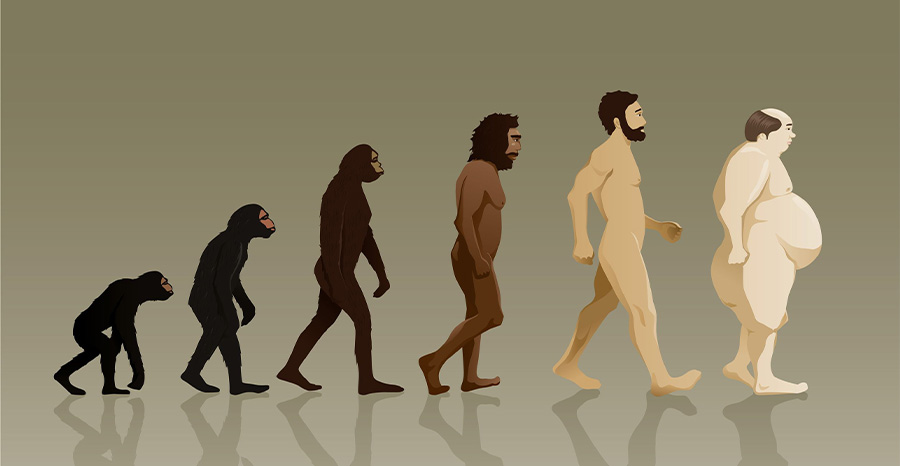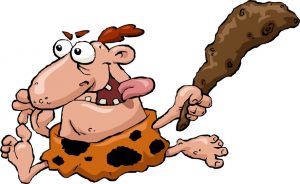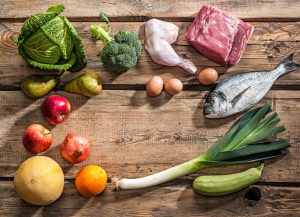
Why Do We Get Fat?
Have you ever wondered why your body stores fat in the first place? Of course we all know that if we eat more calories than our body burns, we’ll gain weight and if we eat less, we’ll lose weight. But what kind of weight? What tells our body to take any excess calories we just consumed, and store them as fat rather than muscle?
Cavemen and Survival Fat

The answer goes back a long way, to pre-history. When we humans were hunter-gatherers, moving over the countryside in small groups (because the land would not support large groups) we depended upon two sources for food. First and foremost, what the gatherers could find. This consisted mostly of low calorie foods such as fruits, wild vegetables, nuts and edible roots.
While many of these foods contained essential vitamins, it took a lot to sustain an adult human. Remember that these people were moving, all the time. That burns a lot of calories. An adult male living like that would have burned a minimum of 4,000 calories per day, and that assumes a slight build without much muscle to maintain. Eating 4,000 calories per day on a raw foods diet would have been near impossible.
Too Bad Refrigerators Hadn’t Been Invented Yet
Unless the hunters were able to kill something, something large enough to feed the whole family group, they would rapidly starve. But even when there was a successful hunt, the people had a problem. No refrigeration. This could mean the meat would go bad anywhere from 12 hours in a hot climate, to a few days in a cold one. Since we didn’t have homes to shelter in, most people would have chosen to live in warmer climates. This meant that the meat had to be consumed quickly, before it rotted and could no longer be eaten.
So following a successful hunt the people would gorge themselves. They had to in order to eat as much as they could before it went bad.
When Storing Fat Was a Good Thing
In this scenario, storing fat was a good thing. It would carry you through until the next successful hunt. But how did their body know to store the excess calories as fat? By a chemical trigger known as an insulin spike, and it’s that same insulin spike that’s the culprit in our epidemically obese culture today! Where it used to be a good thing, necessary for survival, now it’s a royal PITA that makes it well nigh impossible for the average person to stay lean.
The Evil Insulin Spike
We all know that our pancreas produces insulin, and that insulin regulates blood sugar. But it turns out that insulin is also directly responsible for telling our body to store what we just ate as fat. When we eat a lot of food very quickly (or the wrong kinds of food in any amount at any speed) the food breaks down and produces a sugar rush.
Sugar is the fuel that our body runs on but too much sugar in our bloodstream can kill us, so our body produces insulin to regulate the sugar level. A lot of sugars being released all at once also means a lot of insulin, and that rush of insulin is known as an ‘insulin spike’, and it’s the chemical trigger that tells your body to store the excess calories as fat.
Thousands of years ago this was a survival mechanism. Today, with our sugar and processed foods laden diet, it’s the reason why so many of us are overweight. We are constantly giving ourselves insulin spikes, both from the foods we eat, and the way we eat them.
The Keys to Not Storing Fat
So the key to stopping your body from storing fat is two-fold. First, yes, consuming no more calories than our body needs, but also consuming them in such a way as to avoid insulin spikes. The insulin spike is so powerful that it’s entirely possible to take two people with exactly the same body composition and have them eat exactly the same number of calories in a day, but person One will eat foods that don’t produce an insulin spike, while person Two will eat a diet high in processed grains and sugars. At the end of a year, person One will weight exactly the same, while person Two may have gained several kilos.
How I Keep the Fat Off: The Secret is Diet
While I’m not a licensed dietician, and so therefore can’t tell you exactly how to eat to avoid insulin spikes, I can tell you what I eat. I eat smaller meals closer together, usually eating every 3 hours or so throughout the day. By spreading my food consumption more evenly through the day, and eating smaller meals, I’m not giving my body a huge rush of food all at once. I’m also avoiding putting my body in to ‘starvation mode’ as a result of going too long without food, as many people in our culture do by often going 6 – 8 hours between lunch and dinner.
Starvation mode means your metabolism drops to conserve energy, and this state sets you up for a larger insulin spike when you do eat as your body is now desperate for calories. I also avoid eating after dinner, as I’ll be going to sleep soon. My metabolism will drop to very low levels during this period, so my body doesn’t need food then.

In addition, I eat a diet high in proteins, fruits and vegetables and including some whole grains. By whole grains I don’t mean whole grain bread. Bread of any kind is a processed grain and will produce an insulin spike. I make my own homemade Muesli with whole, unprocessed oats, raisins, sunflower seeds and nuts – and absolutely no sugar! All of these foods will not produce an insulin spike unless eaten in large quantities all at once.
Knowing the answer to ‘why do we get fat’ and how to avoid it is a key concept to not only keeping fat off our bodies, but losing it effectively as well. In coming articles, I’ll discuss exercise and fat loss, but I’ll keep referring back to this one. If you don’t know how to avoid the insulin spike, you’ll be greatly reducing the effectiveness of any exercise you do to lose weight.
If you are looking for the best quality gym equipment, visit us at our stores in Perth, Sydney, and Melbourne, or call us at 1300 85 65 42. Our skilled customer service is always ready to assist you with buying gym equipment for your commercial or home gyms.
Will Dove
Latest posts by Will Dove (see all)
- Body Weight Training 2.0: Calisthenics - 22 Apr
- All About Protein Powders - 9 Apr
- Top 5 Fitness Trends for 2019 That You Should Try - 30 Mar
